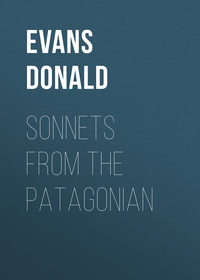Kitap dosya olarak indirilemez ancak uygulamamız üzerinden veya online olarak web sitemizden okunabilir.
Kitabı oku: «Sonnets from the Patagonian»
ADVERTISEMENT
My dear Cornwall Hollis:
With the Allied cause crumbling away it is high time we thought of aesthetics. As a triste jest I said that to you the other day, and your reply was a plea to let you write a preface for a new edition of my forgotten Sonnets from the Patagonian. I am at last persuaded, and who but you should do the preface?
With Mitteleuropa a fact it should be apparent to any honest, thinking man that we are losing the War. Perhaps, in a larger sense, we have already lost the War and the dusk of the Anglo-Saxon is come. Then we are at last joined with the Héllenes and Latins in the descending scale, and it is the Teuton now approaching the perihelion, with the Slav, yet to conquer, in the far distance. But that is an eye-survey for eternity, and we have merely to do with the finite present. So we may still think of resistance, and not yet abandon hope of postponing defeat.
It is now the hour for the supreme test of America, and she too must fail, as our Allies have failed, before the Huns unless somewhere she can find the beauty and the strength of the human soul with which to give battle. For the first time in history it is souls, not guns, that will win the War, and remember, my dear friend, that Beauty is more necessary than food that the soul may live.
We are all but engulfed in error. We say that we do not hate the German people; it is the Kaiser we are fighting. A pitiful self-delusion! It must be the German people we hate as an overshadowing race, if our fight is to have even the excuse of the inflamed passion of the survival of the fittest. We must acknowledge the Kaiser as the symbol of the best organized form of government, unless we are frankly anarchists; the most efficient, the most powerful, the most nearly approaching a practical socialism. Let us, therefore, start afresh. We hate the German people, for they have threatened our complacent supremacy as lords of the world. Now we are at least truthful.
Thus far, the Allies have failed signally as a military force. The Europeans have forgotten how to fight, and we in America have never learned. We have put too much faith in materialism, and betrayed the Soul and Beauty. There is more to life than living, and more to an army than arms. The moment is here that demands we scrap the military leaders, as such, and seek stronger. Why not then turn to the Poets to direct the War, for, lo! it was the Poets who in seven days won the Irish Revolution. None knows better than you how I begrudge giving the ever-turbulent West Britons any praise, any glory, but there is the simple truth. They vanquished the foe because they first had conquered fear, and then nought could stand against them.
If we could purge ourselves of our fear of Germany we should capture Berlin. Could I enlist a Battalion of Irreproachables, whose uniforms should be walking suit, top hat and pumps, and their only weapon an ebony stick, and sail tomorrow, we should march down Unter den Linden in a month, provided wrapped in our kerchiefs we carried the Gospel of Beauty, and a nonchalance in the knot of our cravats.
Verily, verily, men are killed solely because they fear death, and turn their backs on Beauty, for only ugliness and error can destroy, and ugliness in the end destroys itself.
There is really no horror in the War. Even in the ridiculous way we are now fighting it is all a shabby, stupid sham. That chap Griffith gave us a more realistic spectacle in "The Birth of a Nation." Far too few men are actually killed and wounded, and the job is much too large for the materialists. They do not know how to employ effectively the huge forces they have raised into being.
